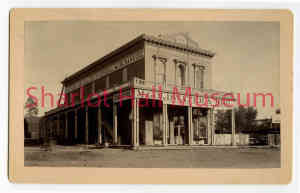M. Goldwater & Bro Store
details
Erwin Baer, Photographer, Prescott, Arizona Unknown bub8056pi.jpg BU-B-8056 B&W 1400-8056-0007 bub8056pg Photo Card Print 6x9 Historic Photographs 1880s Reproduction requires permission. Digital images property of SHM Library & ArchivesDescription
The M. Goldwater & Brother Store was located on the southeast corner of Cortez and Union Streets in Prescott, Arizona.
Although Joseph Goldwater was the titular head of the company, his involvement was minimal although he still operated as purchasing agent for the business out of California. However, Michael and his son, Morris, were the principal operators of the Goldwater Store.
Michael and Morris had this new store built to closely resemblance Howey’s Hall, which was the first building they rented before constructing their own. This new building was constructed during 1879 and included a second-floor meeting place for the Masons Aztlan Lodge group. The new location opened with appropriate fanfare in January 1880.
The store advertised almost everything an early settler could want: cigars, ammunition, salmon bellies, canned goods, spices, women’s underwear, wallpaper, furniture, hardware, barley "in quantities to suit," and more. Credit was given liberally, which led to many happy customers.
Later in 1880, Michael and Joseph dissolved their nearly three-decade partnership, and the name changed from J. Goldwater & Bro. to M. Goldwater and Son. The son, of course, was Morris.
In 1882, Morris’ brother, Baron Goldwater, moved to Prescott to help with the operation of the store. Baron worked closely with Morris and the name of the store was changed to M. Goldwater and Bro. Due to the Prescott success, Baron strongly urged the family to open a Goldwater store in Phoenix, Arizona. He finally got permission to proceed in 1896. The venture was hugely successful. It was primarily a dry goods and ladies-wear enterprise and eventually expanded into several new locations. It was in Phoenix in 1909 that Baron’s son Barry was born – who would later become Arizona Senator, Barry Goldwater. As a youngster, Barry had spent time in Prescott with Uncle Morris working at the Goldwater Store. It should be noted that Barry kicked off his presidential run in 1964 with a speech on the steps of the Yavapai County Courthouse.
For more than fifty years, the Prescott Goldwater store prospered, and Morris became a local celebrity and civic leader. When the depression hit in 1929, many businesses encountered serious financial problems and the local Goldwater store was no exception. In January 1930, the store closed its doors.
Purchase
To purchase this image please click on the NOTIFY US button and we will contact you with details
The process for online purchase of usage rights to this digital image is under development. To order this image, CLICK HERE to send an email request for details. Refer to the ‘Usage Terms & Conditions’ page for specific information. A signed “Permission for Use” contract must be completed and returned. Written permission from Sharlot Hall Museum is required to publish, display, or reproduce in any form whatsoever, including all types of electronic media including, but not limited to online sources, websites, Facebook Twitter, or eBooks. Digital files of images, text, sound or audio/visual recordings, or moving images remain the property of Sharlot Hall Museum, and may not be copied, modified, redistributed, resold nor deposited with another institution. Sharlot Hall Museum reserves the right to refuse reproduction of any of its materials, and to impose such conditions as it may deem appropriate. For certain scenarios, the price for personal usage of the digital content is minimal; CLICK HERE to download the specific form for personal usage. For additional information, contact the Museum Library & Archives at 928-445-3122 ext. 14 or email: orderdesk@sharlot.org.




